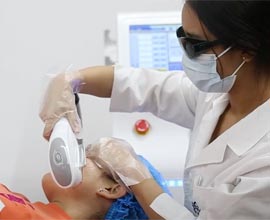Newangie
Newangie Technology Co., Ltd., is a professional beauty machines manufacturer and supplier.
Specializing in the production of high-end beauty machines.
Email:info@newangie.com Whatsapp: +8615227306803
Views: 0 Author: Site Editor Publish Time: 2023-10-10 Origin: Site







Laser hair removal is a popular cosmetic procedure that offers long-lasting hair reduction. However, operating a laser hair removal machine is not something that just anyone can do. It requires training, certification, and a thorough understanding of the equipment and the human skin. In this article, we will explore who can operate a laser hair removal machine and why professional expertise is crucial in ensuring safety and effective results.
1. Licensed and Certified Professionals:
In most countries, laser hair removal machines are classified as medical devices. Therefore, they should only be operated by licensed and certified professionals. These professionals typically include:
Medical Doctors (MDs): Dermatologists or other medical practitioners may operate laser hair removal machines after receiving specialized training.
Nurse Practitioners (NPs): NPs with the necessary training and certification may also perform laser hair removal treatments.
Licensed Electrologists: Some states require electrologists to obtain specific training and licensure to use laser hair removal equipment.
Licensed Estheticians: In some regions, licensed estheticians are allowed to perform laser hair removal under the supervision of a medical professional.
2. Certified Laser Technicians:
Many professionals who perform laser hair removal receive specialized training and certification as laser technicians. These programs cover essential topics such as laser safety, skin anatomy, hair growth cycles, and treatment protocols. Certified laser technicians are skilled in choosing the correct laser settings, ensuring patient safety, and achieving optimal results.
3. Training and Education:
Laser hair removal training programs are essential to understand the intricacies of the procedure. These programs should be accredited and provide hands-on training with the specific laser equipment being used. Ongoing education is also vital to stay updated on the latest technology and best practices in the field.
4. Understanding Skin Types and Laser Settings:
Different skin types and tones require different laser settings to ensure both safety and effectiveness. Professionals must have a deep understanding of how the laser interacts with various skin types and be able to adjust settings accordingly to minimize the risk of adverse reactions.
5. Safety and Risk Management:
A qualified operator should also be well-versed in safety protocols and risk management. This includes conducting thorough patient assessments, providing appropriate eye protection, and addressing potential side effects or complications.
6. Compliance with Regulations:
Professionals operating laser hair removal machines should adhere to local regulations and guidelines governing the use of these devices. Compliance ensures patient safety and the legal operation of the equipment.
In summary, laser hair removal is a specialized procedure that should only be performed by trained and certified professionals. The use of laser technology on the skin requires a deep understanding of skin biology, laser physics, and safety protocols. By entrusting your laser hair removal treatment to qualified professionals, you can ensure a safe, effective, and successful outcome. Always do your research and choose a reputable and certified provider for your laser hair removal needs.